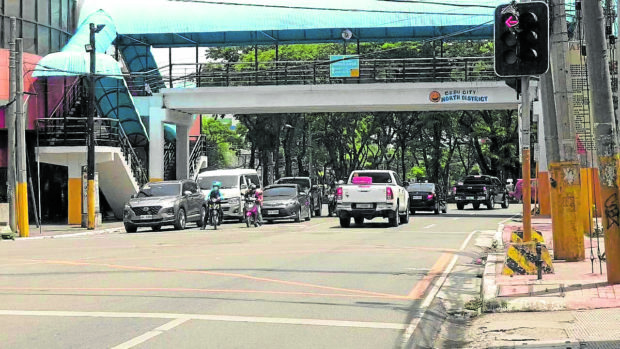
NO CONGESTION Only a few vehicles ply the streets of Cebu City while an enhanced community quarantine is imposed in the city. —DALE ISRAEL
CEBU CITY—Researchers studying the new coronavirus disease (COVID-19) outbreak in the country have asked the government to carefully evaluate the situation in Cebu City and the rest of Cebu province before easing quarantine restrictions on the island.
Experts from the University of the Philippines (UP) and University of Santo Tomas (UST) projected that the number of infections could reach 30,000 by July 31 if Cebu City’s enhanced quarantine status (ECQ) would be downgraded. If the strict lockdown continues after July 15, the number of cases in Cebu may stay at 15,000 by the end of the month, based on the current trend of infections, they said.The study, “COVID-19 forecasts in the Philippines: NCR (National Capital Region), Cebu and COVID-19 hot spots as of June 25,” was posted on the UP website on June 29 and updated on July 2.As of Monday, COVID-19 cases in Cebu province had reached 12,217, with 546 deaths and 5,136 recoveries, according to the Department of Health. Cebu City accounts for 7,359 of these cases.President Duterte was set to announce on Wednesday whether to extend or downgrade the ECQ status of Cebu City, the only local government still under this quarantine restriction due to the surge of infections last month.
The study noted that when the city was placed under a more relaxed general community quarantine (GCQ) on June 1, the number of COVID-19 cases doubled. Figures collected between June 8 and June 25 showed that cases rose from 3,400 to 6,400.
The number of hospital admissions due to COVID-19 also doubled during that period.
Recalibrate strategies
When the city’s status was reverted to ECQ on June 16, the study said the number of cases and hospital admissions slightly dropped.
The researchers suggested that if restrictions would be eased, these should be matched with “more pandemic surveillance, effective strategies for social distancing, and compliance with other health protocols, including vigorous promotion of personal hygiene practices, wearing of masks and other personal protective equipment (PPE), and increased testing, tracing and isolation.”
Reopening business“To this end, we recommend that the government review its national strategy to combat COVID-19 in the country. The government must reexamine and recalibrate its strategies to ensure that the transmission of SARS-Cov-2 virus does not further increase beyond the capacity of the health-care system to respond,” they said.But Mayor Edgardo Labella wanted the city’s status to be downgraded to GCQ to allow the reopening of businesses and restart the local economy that had been crippled by the pandemic.
“After all, if you look at the statistics in Cebu City, there has been a high recovery rate. We have the highest recovery rate [in the country] at 54 percent. This is something that must be seriously considered,” Labella said on Tuesday.
He said the continued increase in COVID-19 cases should not surprise anyone since it was the only local government that had been conducting mass testing among its constituents. “But we have to continue doing (mass testing) to save lives,” he said.
Environment Secretary Roy Cimatu, COVID-19 point person in Cebu, last week noted that Cebuanos had started to follow health protocols, and if this behavior persisted, “we are optimistic that the ECQ can be downgraded to GCQ by July 16.”
Cops, soldiers sick
Police Brig. Gen. Albert Ignatius Ferro, director of the Central Visayas police, said he did not want the quarantine restrictions eased as virus cases in Cebu City remained high.
Close to 1,000 policemen, including 160 from the Special Action Force in Camp Crame, were sent to Cebu City last month to help enforce the ECQ, the strictest form of quarantine in the country.
About 200 policemen and 77 personnel of the Philippine Navy in Cebu tested positive for COVID-19 as of July 14. They have been put in isolation in their camps.
In Negros Oriental province, at least 20 soldiers contracted the virus after they were assigned to Cebu City last month. —WITH REPORTS FROM RAFFY CABRISTANTE INQ